José López Portillo facts for kids
Quick facts for kids
José López Portillo
|
|
|---|---|
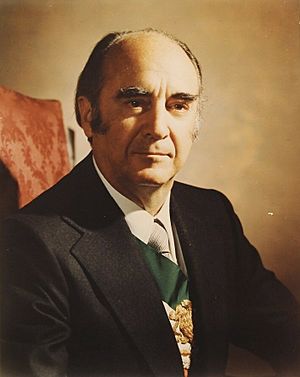 |
|
| 58th President of Mexico | |
| In office 1 December 1976 – 30 November 1982 |
|
| Preceded by | Luis Echeverría |
| Succeeded by | Miguel de la Madrid |
| Secretary of Finance and Public Credit of Mexico | |
| In office 29 May 1973 – 22 September 1975 |
|
| President | Luis Echeverría |
| Preceded by | Hugo B. Margáin |
| Succeeded by | Mario Ramón Beteta |
| Director of the Federal Electricity Commission | |
| In office 18 February 1972 – 29 May 1973 |
|
| Preceded by | Guillermo Villarreal Caravantes |
| Succeeded by | Arsenio Farell Cubillas |
| Personal details | |
| Born |
José Guillermo Abel López Portillo y Pacheco
16 June 1920 Mexico City, Mexico |
| Died | 17 February 2004 (aged 83) Mexico City, Mexico |
| Resting place | Cemeterio Militar, Mexico City, Mexico |
| Political party | PRI |
| Spouses |
Carmen Romano
(m. 1951; div. 1991)Sasha Montenegro
(m. 1995) |
| Parents | José López Portillo y Weber Refugio Pacheco Villa-Gordoa |
| Alma mater | National Autonomous University of Mexico (LLB) |
| Signature | |
José López Portillo (born June 16, 1920 – died February 17, 2004) was a Mexican writer, lawyer, and politician. He was a member of the Institutional Revolutionary Party (PRI). López Portillo served as the 58th president of Mexico from 1976 to 1982. He was the only candidate in the 1976 presidential election. This made him the only president in recent Mexican history to win an election without anyone running against him.
During his time as president, López Portillo started some changes to make politics more open. He passed a law in 1977 that made it easier for new political parties to join elections. This allowed groups who had fought against the government to take part in politics legally. His government also gave forgiveness to many people who had been involved in conflicts.
Economically, his presidency saw big investments in Mexico's oil industry. This happened after new oil reserves were found. These investments first helped the economy grow. However, when oil prices dropped in 1981, Mexico faced a serious debt crisis. By 1982, Mexico announced it could not pay its debts. This led to a lot of money leaving the country. López Portillo then took over the country's banks. By the end of his term, Mexico had the highest foreign debt in the world. His time in office was also known for government corruption.
After he left office, some officials from his government were investigated for corruption. López Portillo himself was suspected of being involved, but he was never charged with any crimes.
Contents
Early Life and Education
José López Portillo was born in Mexico City. His father, José López Portillo y Weber, was an engineer and historian. His mother was Refugio Pacheco y Villa-Gordoa. He was the grandson of José López Portillo y Rojas, who was a lawyer and politician. López Portillo studied law at the National Autonomous University of Mexico (UNAM).
Early Career in Politics
After finishing his studies, López Portillo began his political career in 1959. He joined the Institutional Revolutionary Party (PRI). He held several jobs in the government before becoming the finance minister. He served as finance minister from 1973 to 1975. This was during the presidency of Luis Echeverría, who was a close friend from his childhood.
Presidency
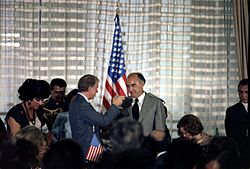
López Portillo was elected president in 1976. He ran without any opponents. The PRI party was very strong at that time, so his win was almost guaranteed. He is the last Mexican president to have run unopposed.
When he became president, Mexico was facing economic problems. He started a big plan to help Mexico's economy grow. This plan used money from new oil discoveries. These oil reserves were found in the states of Veracruz and Tabasco. Mexico's state-owned oil company, Petróleos Mexicanos (Pemex), made these discoveries. In 1980, Mexico and Venezuela started the Pact of San José. This project sold oil at lower prices to countries in Central America and the Caribbean.
At first, this economic confidence helped the economy grow. But by the time he left office, the economy had gotten much worse. Mexico faced a severe debt crisis and could not pay its loans.
One of his last actions as president was to take over the country's banking system. He announced this on September 1, 1982.
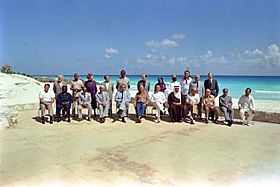
During his time as president, some people accused him of corruption. They also said he gave government jobs to his family members.
An important change was made to the election system during his term. The number of members in the Chamber of Deputies increased to 400. This reform also made it easier for smaller opposition parties to take part in elections.
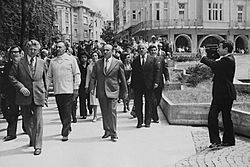
Family in Government
The López Portillo government was known for many of the President's relatives holding public jobs. He appointed his sister, Margarita López Portillo, to lead the General Directorate of Radio, Television and Cinematography (RTC). His cousin, Guillermo López Portillo, became the first head of the new National Institute of Sport (INDE). His son, José Ramón López Portillo, was appointed Subsecretary of Programming and the Budget. His daughter, Paulina López Portillo, also started a career as a pop singer during his presidency. The First Lady, Carmen Romano, traveled in Europe with the Philharmonic Orchestra of Mexico City. This orchestra was started and paid for by the Mexico City government.
Foreign Policy
In 1981, the Cancun Summit took place in Mexico. This meeting brought together 22 leaders from rich and developing countries. During López Portillo's presidency, Mexico supported the Sandinista National Liberation Front in Nicaragua. In 1977, Mexico started diplomatic relations with Spain again after the death of dictator Francisco Franco. Also, in 1979, Pope John Paul II visited Mexico for the first time.
Choosing a Successor
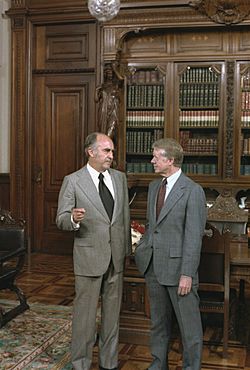
As his term ended on December 1, 1982, López Portillo chose his replacement. This was part of a tradition in his party. He picked Miguel de la Madrid to be the next president. De la Madrid was chosen for his skills in finance and management. These skills were very important after the Mexican currency lost value in February 1982 and the economy faced a crisis.
On September 1, 1982, López Portillo gave his last speech to the Congress. In this famous speech, he talked about the economic crisis. He announced that the banks would be taken over by the government. He also asked for forgiveness for his mistakes and for the economic problems. He became very emotional during his speech.
López Portillo was the last president from the Institutional Revolutionary Party who strongly supported government control over the economy. Presidents after him have generally favored free trade.
Personal Life and Death
López Portillo's first wife was Carmen Romano. After he left the presidency, he divorced Romano. In 1995, he married Sasha Montenegro, an actress born in Yugoslavia. They had two children, Nabila and Alejandro, but later separated.
He was the brother of the Mexican novelist Margarita López Portillo. She passed away in 2006.
José López Portillo died in Mexico City at 83 years old. He passed away due to heart problems caused by pneumonia. He was buried at the Pantheon Federal District military cemetery in Mexico City.
Public Opinion
In a survey from 2012, 25% of people thought López Portillo's time as president was "very good" or "good." 17% said it was "average," and 44% thought it was "very bad" or "bad."
Works
- Génesis y teoría del Estado moderno (1965)
- Quetzalcóatl (1965)
- Don Q (1975)
- Ellos vienen... La conquista de México (1987)
- Mis tiempos (2 volumes, 1988)
- Umbrales (1997)
- El súper PRI (2002)
Honours
 Knight-Collar of the Order of Boyaca, Colombia (1979)
Knight-Collar of the Order of Boyaca, Colombia (1979) Knight-Collar of the Order of Isabella the Catholic, Spain (1977-10-07)
Knight-Collar of the Order of Isabella the Catholic, Spain (1977-10-07) Knight-Collar of the Order of Charles III, Spain (1978)
Knight-Collar of the Order of Charles III, Spain (1978) Knight of the Royal Order of the Seraphim, Sweden (1980-05-05)
Knight of the Royal Order of the Seraphim, Sweden (1980-05-05)
See also
 | James Van Der Zee |
 | Alma Thomas |
 | Ellis Wilson |
 | Margaret Taylor-Burroughs |


 In Spanish:
In Spanish: